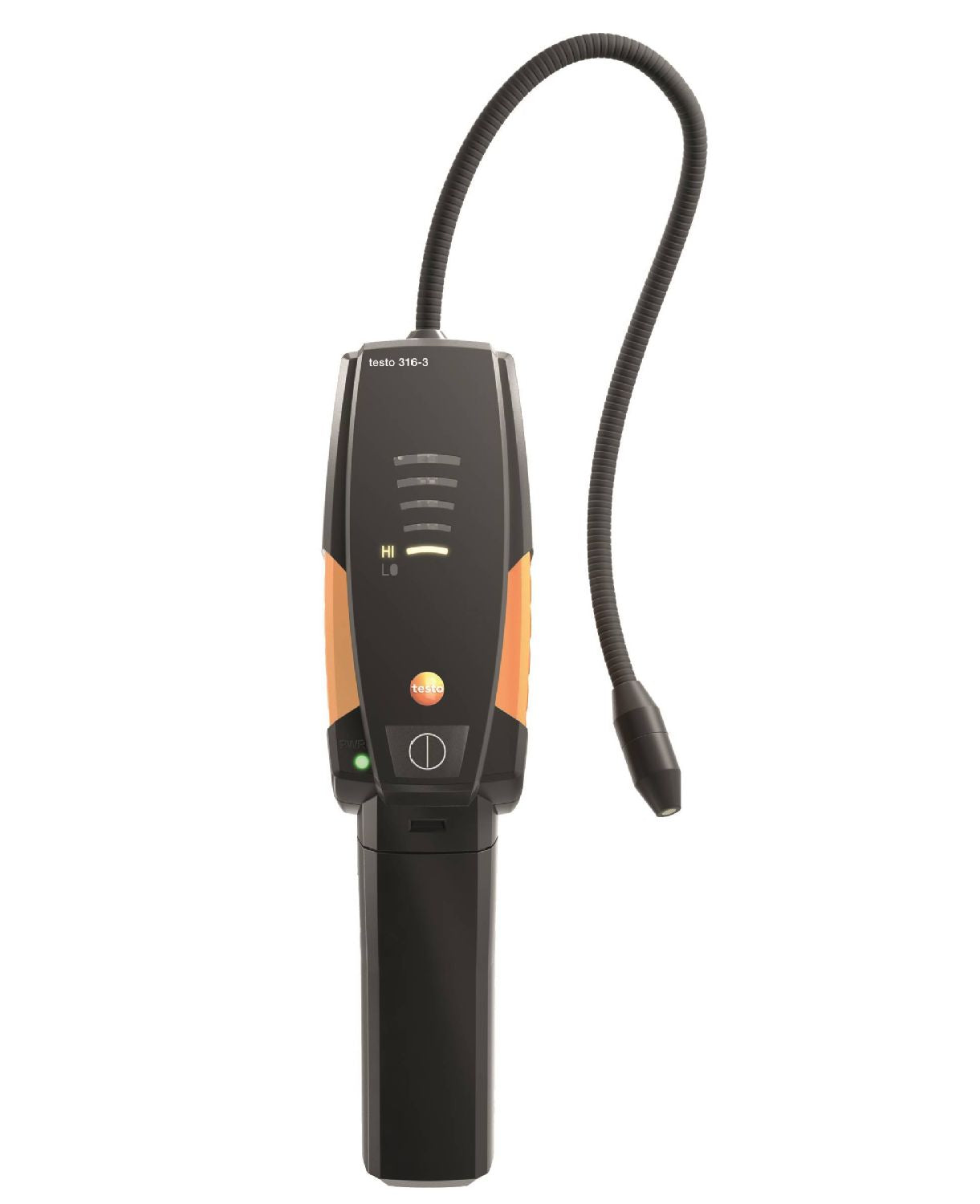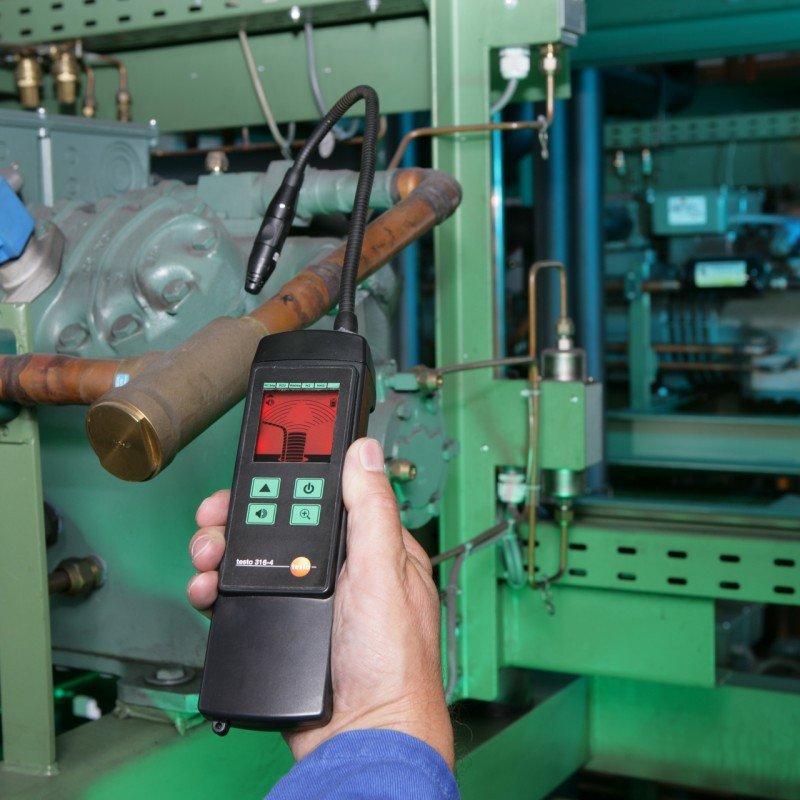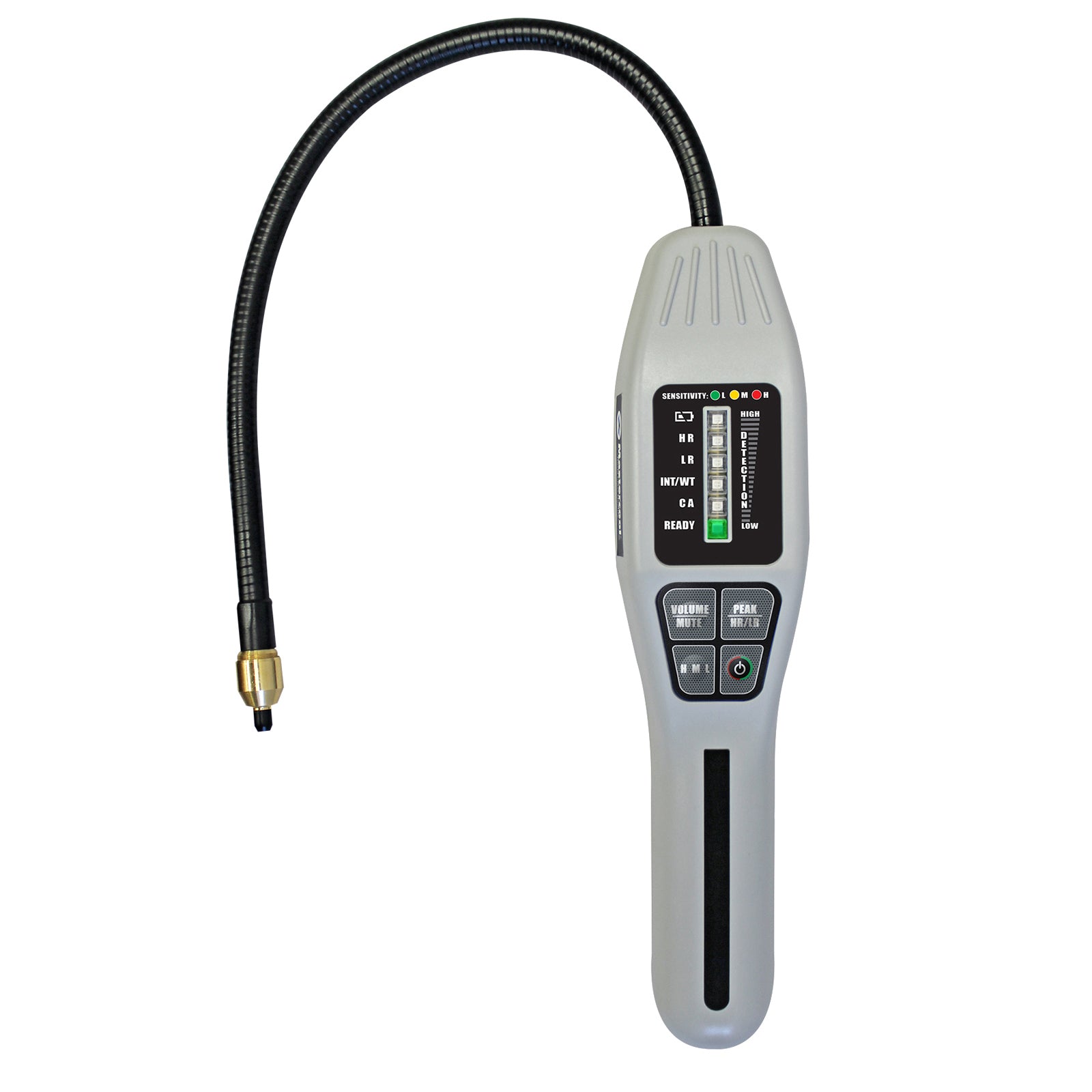
Detect leaks before it becomes serious with a leak detector!
An HVAC system typically contains several moving parts (including the refrigerant), and a leak can occur at any time. Depending on your skill level and the instruments you utilize, detecting a leak can be simple or difficult. As a technician, one tool in your toolbox should never be missing: a reliable refrigerant leak detector! After all, you can't rely on your nose to detect a leak.
This item is essential to your survival. It should be your best friend! Leaks usually generate electrical currents, cause various vibrations, and make noise. A good leak detector will use these characteristics to detect any undetectable, unseen, audible/inaudible leaks.
THE EARLIER YOU DETECT A REFRIGERANT LEAK, THE BETTER
Call the professionals if you discover your air conditioner is running but not cooling. Although pinhole leaks in HVAC systems can occur due to damage, factory faults, or faulty installation, if one doesn't recognize or correct it properly, they can become a greater problem.
It would help if you had it repaired as soon as possible. Don't repair it not only for your comfort but also because refrigerants harm the environment and your health. Refrigerants are hazardous materials that, if inhaled, can be lethal. They may cause harm to the environment by destroying the ozone layer.
Effective refrigerant leak detection is critical for assuring safety and compliance, increasing energy efficiency, and lowering operating costs. Residential professionals can utilize various refrigerant leak detection methods to locate a refrigerant leak. You'll need to use the best and correct instrumentation to accurately identify and repair refrigerant leaks.
RISKS OF NOT DETECTING REFRIGERANT LEAKS
Flammability
When refrigerants come into touch with ignition sources, they are exceedingly flammable and easily combustible.
Top-quality hose fittings, compressor oil, and other gaskets can help limit these dangers.
When dealing with refrigerants in a restricted location, where gas concentrations might quickly build up in the case of a leak, this is especially crucial.
Environmental Effect
Ozone depletion and greenhouse gasses can be harmful environmental effects of refrigerants.
As a result, many previously extensively used substances, such as R-22 have been banned in favour of greener alternatives.
To reduce damage to a minimum, use high-quality hose fittings and ensure all leaks have been repaired.
Health Risks
When ingested in high amounts, refrigerants can cause nausea, headaches, and in some circumstances, death.
It's crucial to know the gas you're dealing with before calculating the risk of a leak. Because R-22 is ten times heavier than air, it forms a "pool" on the floor that can inflict serious injury or death if stepped into by accident.
TYPES OF REFRIGERANT LEAK DETECTOR
Having a high-quality leak detector on hand can assist in detecting and repairing leaks in the safest manner possible.
While you can use many basic tools to detect gas leaks, such as an infrared sensor, some devices will yield more precise results than others.
Let's look at some of the most effective leak detectors.
Analog Refrigerant Leak Detectors
It has a thin metal rod affixed to the handgrip of analog detectors.
This rod contains a little amount of liquid nitrogen, discharged and chilled as you use it.
When this gas comes into contact with a hole, it solidifies. The handheld device can detect this through vibrations and sounds.
Digital Refrigerant Leak Detectors
These gadgets are more effective at discovering leaks than analog equivalents because they work differently.
The major distinction between a digital device and a physical device is that a digital device does not contain a metal rod. Instead, a small microphone has taken its place.
It creates sound waves when this microphone detects nitrogen leaks out of a hole. It then sounds like an alert to let you know where the leak is coming from.
Corona Discharge Detectors
It forces air via an electrical field by these leak detectors.
The current travelling through the wire fluctuates if gases are present in the sample, producing an alarm.
The disadvantage is that this sensor cannot distinguish between gases. The presence of some compounds can even trigger it, resulting in a high number of false alarms.
The extreme sensitivity of these units is well-known.
HOW TO DETECT REFRIGERANT LEAK
Electronic refrigerant leak detection systems, particularly heated diode and infrared technology, are today's most popular refrigerant leak detection methods for HVAC-R technicians.
Your application and specific requirements determine the best refrigerant leak detection method(s). While some experts may have great faith in using older forms, you should know that electronic leak detection systems are the most effective. They detect a wider spectrum of refrigerants faster and be safer and more efficient.
Of course, there is no such thing as a one-size-fits-all solution, and your application will determine the method(s) that are best for you. Finally, having the appropriate instrumentation to perform refrigerant leak detection is critical.
HOW DOES A REFRIGERANT LEAK DETECTOR WORK (INFRARED)
Infrared refrigerant leak detectors are among the most often utilized refrigerant leak detectors by HVAC experts daily. Typically, the sensor on a heated diode detector will go out after working on a larger leak or after immersing the probe in water. Most green industry workers will purchase one of the less expensive detectors to have it in their toolbox.
Infrared detectors differ significantly from their heated diode counterparts. They detect anything containing Chlorine or Fluorine using a heated diode. You can move the probe closer until you have an exact pinpointed position when they discover a leak. It's how most technicians and mechanics work daily.
Infrared refrigerant leak detectors locate refrigerants by scouring a large area slowly and deliberately. Rather than pushing your probe to the exact location, you'll sweep it back and forth or up and down until your alarm goes off.
HOW DOES A GAS LEAK DETECTOR WORK
A gas detector uses several technologies to measure and indicate the concentration of certain gases in the air. Gas detectors are frequently battery-operated devices used for safety purposes to prevent toxic exposure and fire. They can be portable or fixed. Also, they work by signalling high levels of gases with a succession of audible or visible signs, such as alarms, lights, or a combination of signals.
OTHER LEAK DETECTION METHODS
Soap Bubble Method
For decades, household technicians have depended on the soap bubble approach as a constant. It's quite self-evident. At leaking points, bubbles should appear. To discover if there are leaks at specific spots, you use soapy water or a leak detecting spray.
While popular and reliable, the soap bubbles approach suffers from the fact that pinpointing leaks can be difficult in some circumstances. It includes when the leak is small or windy outside. It uses the soap bubble approach with another method, preferably one of the electronic leak detection methods, which may be the most advantageous.
UV/Fluorescent Dye Method
This method involves injecting a specific dye into the refrigeration system and circulating it alongside the host fluid or refrigerant. If the system has any leak spots, the dye will escape and concentrate in these areas. You can easily detect and recognize these leak locations with a UV lamp.
This method has a significant drawback: the fluorescent dye method might harm your HVAC-R system's performance and long-term functioning (s).
Heated Diode
Heating a refrigerant to the point where the molecules split apart detects leaks with heated diodes. The presence of positively charged quantities of chlorine or fluorine, chemical components found in most refrigerants on the market today, originates from this interaction.
Electronic refrigerant detectors use heated diode technology to detect chlorine or fluorine ions and sound an auditory alert to indicate a leak. Compared to corona suppression, this method is less prone to cause false alarms.
WHAT IS THE BEST REFRIGERANT LEAK DETECTOR?
Electronic refrigerant leak detection systems, particularly heated diode and infrared technology, are today's most popular refrigerant leak detection methods for HVAC-R technicians.
Your application and specific requirements determine the best refrigerant leak detection method(s). While some professionals may have great faith in using older technologies, you should be aware that electronic leak detection is the most effective. They are faster at detecting various refrigerants and safer and more efficient.
Below are some of the factors that'll help you buy the best leak detector.
Number of Detectable Gases
Some types are designed to detect a single kind of gas, while others have a sensor cable that can see a wide range of gases, including CFCs, HFCs, HCFCs, and others.
Beyond refrigerants, the most advanced leak detection equipment may even warn you about the existence of other dangerous or explosive gases.
Look for a detector unit that can detect a variety of gas leaks; this will help reduce the cost of your detector by allowing it to be utilized for many applications.
Maintenance
When it comes to gas detection, you should never try to save money on maintenance.
Regardless of the gas leak detector you choose, it's critical to look into the price and availability of consumable parts.
Many detectors contain replaceable sensors; make sure the ongoing expense of these parts is reasonable and that you understand how long the sensors last before investing in a certain type.
Make sure you pick a leak detector with a maintenance and calibration schedule that you can stick to. You don't want to get a gas leak detector that needs constant maintenance regardless of user-level if you're using it occasionally.
Easy to Use
Finally, if you are not an HVAC professional, you must ensure that your purchase model is simple to operate.
Because mistakes with gas can be catastrophic, it's critical to choose a leak detector with presets and straightforward, easy-to-follow instructions if you're new to leak detection.
Fortunately, YouTube is chock-full of lessons on using many of the models on this list, so you shouldn't have any trouble obtaining help if you get lost.
Durability
Detection devices are frequently employed in tight spaces, and drops are unavoidable. Choose a tool that will last as long as feasible.
ABS plastic is widely used and is an excellent long-term dependable material.
Whatever you choose, make sure it has at least a one-year warranty.
A one-year guarantee will ensure that if anything goes wrong with the item while you're getting acclimated to it.
Sensor Type
There are many other types of leak detectors on the market, each with a different level of sensitivity. Still, the infrared refrigerant leak detector and the diode refrigerant leak detector are the two most prevalent.
Your needs determine the finest refrigerant leak detector for you.
Heated diode refrigerant leak detectors are suitable for determining the exact site of a tiny leak and are therefore quite precise.
They do, however, necessitate greater upkeep because the probes are quickly contaminated by dirt and grease, and the sensors, of course, have a finite lifespan.
On the other hand, because their sensitivity is carefully dialled into the target gas, an infrared leak detector is less likely to produce false-positive warnings for gases you aren't looking for.
Furthermore, the sensors outlast those found in a comparable diode refrigerant leak detector.
The major disadvantage of the infrared leak detector is that it requires you to constantly move the probe, making it difficult to identify a little leak.
Sensors can only withstand a certain number of hours of continuous use before they need replacement, so remember this when selecting your unit.
Battery Type
Replaceable vs. rechargeable batteries both have advantages and disadvantages.
It's always easy to replace your power supply with disposable batteries, and there's no degradation over time.
Of course, a continuing cost is connected with replacing the D cell batteries that a gas leak detector set typically uses.
On the other hand, some models come with lithium-ion rechargeable battery packs.
They're effective and powerful, and they're easy to charge.
Of course, if you don't have an extra battery or the battery isn't detachable, you'll have to wait until it's fully charged before using your leak detector, which might take hours. If you need to use a leak detector right away, it can be a problem.
If you're searching for the best refrigerant leak detector, consider if rechargeable or replaceable batteries are better.
HOW A LEAK DETECTOR SAVES THE DAY
Refrigerant is the heart of your air conditioner. If it leaks, the system's performance suffers, eventually failing. A leak may occur when your HVAC system has been working overtime, specifically when cooling RVs or travel trailers. Because you can't rely on your nose to discover the source of the leak, we've produced a list of the best factors for AC leak detectors available in the buying guide.
Buy the best gas refrigerant leak detectors from HVAC Shop in Australia. If you don't detect gas leaks early, there are many risks since they may be flammable and pose health risks. We worked with the top brands for leak detectors to offer you the best options possible.





